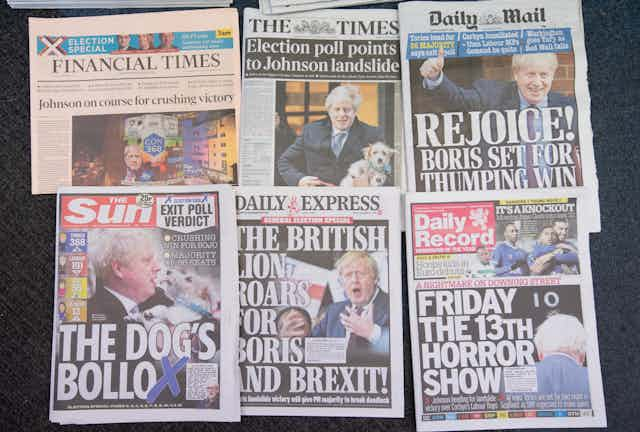You don’t have to deny the growing political significance of social media to accept that the mainstream media continue to play a vital role in informing and priming public opinion during elections. Moreover, both worlds are deeply connected. Fewer people are buying newspapers but plenty are accessing the same content online.
Broadcast and newspaper content is recirculated constantly via social media platforms and TV news remains the principal source of political information for most UK adults.
Crucially, it is professional journalists who, through their privileged access, provide the news and insight about political elites that provide so much of the basis for social media commentary (and complaint).
Loughborough University has been conducting a news audit of the 2019 general election throughout the campaign and our final report has just been published. Our analysis focused on election coverage in weekday TV evening news and the national paid-for press. It provides an empirical basis for testing some of the claims and counterclaims made about the media’s performance during this vital political period.
A Brexit election?
One of these is the assumption that Brexit would dominate the media campaign. This had major party political implications, as the Conservatives, and to a lesser extent the Liberal Democrats, sought to bring the issue to centre stage and Labour aimed to shift the agenda onto other matters – in particular, healthcare provision.
Our research shows that the 2019 media election was initially about Brexit, then it wasn’t about Brexit, and then it was again. Figure 1, below, compares the weekly trajectory of the issue in comparison to the other dominant issues in the media agenda. Brexit was the most dominant theme at the start and end of the campaign but in the intervening periods its prominence lessened, to the point that in week four it fell behind the two other substantive policy themes of the campaign: “health/healthcare” and “business/economy/trade”.

This dramatic decline in the penultimate week needs some interpretation. Brexit haunted the hustings throughout the election – but by that stage it had started to become part of the background context of the campaign rather than its focal point. This seems to have been noted by the prime minister, Boris Johnson, who voiced his concerns at the time that “people have slightly lost their focus on the political crisis that we face … And I think maybe we need to bring that back”.
His mantra-like reiteration of the “Get Brexit Done” soundbite in the final days of the campaign undoubtedly fuelled the final rush of Brexit coverage.
But even when Brexit was reported, there was a lack of fiscal analysis as to what implementation might mean. This contrasted with the detailed appraisals frequently applied to other manifesto commitments. For example, the Institute for Fiscal Studies gained considerable media exposure on the basis of its analyses of parties’ spending pledges and projections.
Read more: UK election 2019: why the BBC's approach to the IFS is a threat to its impartiality
Our research shows that 53% of these appearances linked to taxation related coverage and 46% to business and economy coverage. Only 8% connected to Brexit. (NB these percentages are separate and do not add up to 100).
Partisan press
We also monitored the scale of press partisanship in the campaign. That the national press in the UK is habitually pro-Conservative is news to nobody – but it is the scale of this partisanship rather than the fact of it that requires analysis.
In the immediate post-mortems after Labour’s substantial defeat, some commentators have argued that the party should not seek to attribute its failure – even partly – to the hostility of the national press. Anti-Labour newspaper editorialising is just part of the electoral landscape that the party needs to work around or push through.
Our research is solely focused on content and offers no basis for drawing conclusions about cause and effect. That said, our analysis challenges the view that 2019 was “business as usual” in partisanship terms. Figure 2 shows the week-by-week totals and demonstrates how substantial the negative coverage of Labour was throughout the formal campaign and how it intensified. It is important to appreciate that this count was not entirely comprised of overt editorialising. It also included more factual news coverage that reported upon issues that had obviously negative implications for a party.

Figure 3 compares the aggregate trends found in 2019 with those we identified, using identical measures, in the 2017 general election. The results show that newspapers’ editorial negativity towards Labour in 2019 more than doubled from 2017. In contrast, overall press negativity towards the Conservatives reduced by more than half.

We must rightly be cautious about overly media-centric explanations for political outcomes, but this is not the same as saying the media’s role was insignificant. In 2019, the Conservatives ultimately wrested control of the issue agenda in TV and press coverage and secured a far more emphatic newspaper endorsement than during the previous campaign. These factors cannot have helped Labour’s cause.

